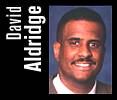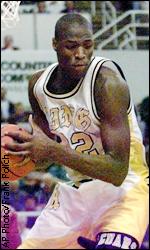
| ||||||||||||
ALSO SEE Aldridge: All this over a kidney Aldridge: All this over a kidney Aldridge: No Magic trick Aldridge: No Magic trick | ||||
| ESPN.com NFL | ||||
 | Wednesday, March 29 An NBA minor league won't solve any problems Special to ESPN.com | |||
So I'm in Syracuse this week doing the NCAA men's East Regional finals. (Hey, I'm versatile.) And about five seconds after I sit down to watch Seton Hall's practice on Thursday, who should walk by but Billy Packer, King of College Basketball. He says he likes my work. I say thanks.
And then I listen for 20 minutes while Packer slams everything about the NBA. The new arenas. The quality of play. The Commish. Especially the Commish. Boy, does the Pac Man have a thing for the Commish. He holds the Commish responsible, and I am not making this up, for the destruction of American civilization as we know it. Ask the guy next to me if I'm lying. (Well, actually, I don't know who the guy next to me is. I told you -- this is college basketball.) | |
| Leon Smith was a star last year for his high school team in Chicago. |
| Aldridge's Rankings | |
|
THE TOP 10 1. L.A. Lakers 2. Indiana 3. Utah 4. Portland 5. San Antonio 6. Minnesota 7. Miami 8. Phoenix 9. Toronto 10. New York
THE BOTTOM FIVE |
I know I said last week that the Pistons wouldn't be all that crazy if they went after Bill Laimbeer. But just keep this in mind: Even if the local media is fanning the flames, it is far from unanimous among the Detroit braintrust. The Pistons have been reborn under interim coach George Irvine. Players love his no-nonsense but quiet way. If they're playing selfishly, he'll tell them in front of the others, but won't scream it. And even if Irvine doesn't want the gig full-time, it'll be difficult to hire his exact opposite in terms of demeanor. Also, if you think Grant Hill is sold on Laimbeer, think again. Hill will really need to be convinced. He did a commercial with Laimbeer a while back and, according to a source, found the time with His Royal Sneerness quite grueling. Zo on Timmy
One reason why Alonzo Mourning says he isn't worried about Tim Hardaway's physical condition is he doesn't think the Heat need Tim Bug to get back to his best crossover days in order to win. Even though Mourning concurs that Hardaway may occasionally try too hard to show people he can still play. "Because of his injuries, it's kind of set him back a little bit, but he's still effective for this team," Zo says. "I don't think we need all his athletic ability for us to be successful. We don't need that. All we need to do is run our offense, 'cause I think he's still able to get into the paint. "I mean, look at John Stockton. He don't have a whole lot of athletic ability. I mean, look at Jeff Hornacek. He doesn't have a whole lot of athletic ability. But those guys are mentally tough, so when the game gets tight, they execute the hell out of their offense, and they break the best defensive teams down. They've broken us down ...Timmy can still shoot. He hasn't stopped shooting the ball well. He's not able to do the things he used to do, and his leg is slowing him down, but I know he's still effective for us." Let the Sun shine
The first thing Suns VP Bryan Colangelo did after Jason Kidd's 7 a.m. surgery on Thursday to repair his broken ankle was call league VP of operations Rod Thorn and tell him that Kidd will be back well before the Summer Games commence in Australia in September. It was only the latest disaster that the Suns have had to face this season. They've had to deal with Danny Ainge's abrupt resignation and Anfernee Hardaway's plantar fascitis; Tom Gugliotta nearly dying after ingesting an herbal supplement in December and then wrecking his knee; Rex Chapman undergoing an emergency appendectomy last week and, now, Kidd breaking his ankle. "I'm more of a crisis manager than a general manager," Colangelo joked, kind of.
| Feedback for David | |
| So what are your thoughts on this column by David Aldridge? What about some other columns you read on ESPN.com? We want your feedback, good or bad. Click here to e-mail us your thoughts. |
As the Philadelphia Inquirer first reported, Brown has a five-day window at the end of every season in which he can walk from his contract. The Sixers want to remove that clause before giving Brown a new deal. Brown's agent has been negotiating with team president Pat Croce for three months. Croce originally argued that coaches don't get contract extensions, a notion the Brown camp dismissed as "ridiculous." But word is that the escape clause isn't a deal breaker. Expect Brown back in Philly next season.
|
ESPN INSIDER
Copyright 1995-2000 ESPN/Starwave Partners d/b/a ESPN Internet Ventures. All rights reserved. Do not duplicate or redistribute in any form. ESPN.com Privacy Policy. Use of this site signifies your agreement to the Terms of Service. | ||||